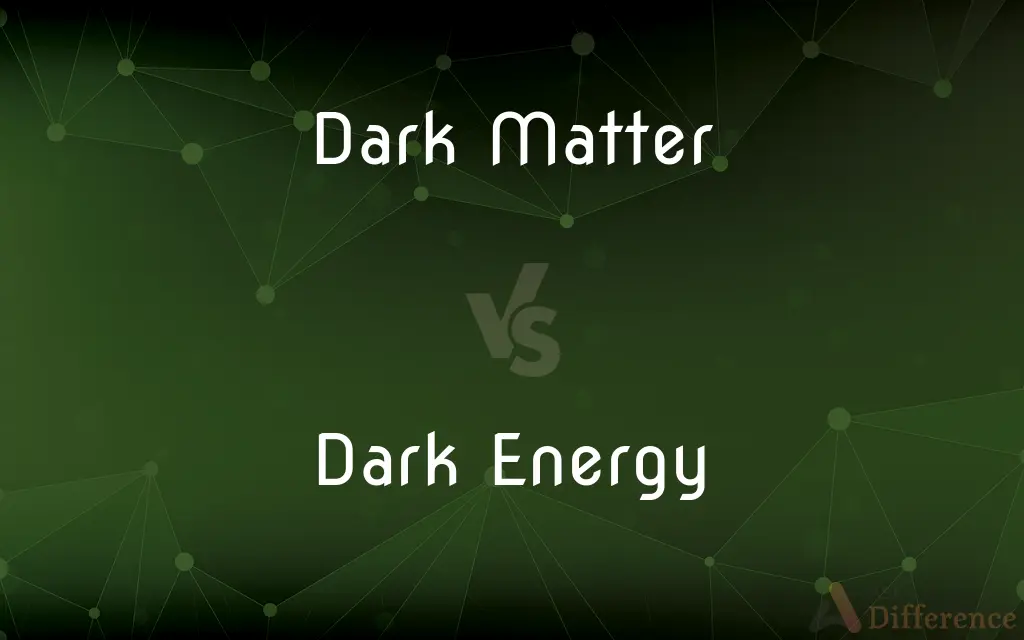Dark Matter vs. Dark Energy — What's the Difference?
By Tayyaba Rehman & Fiza Rafique — Published on March 16, 2024
Dark matter is a theoretical substance that exerts gravitational forces, affecting the universe's structure, while dark energy accelerates the universe's expansion.

Difference Between Dark Matter and Dark Energy
Table of Contents
ADVERTISEMENT
Key Differences
Dark matter is an unseen form of matter that does not emit, absorb, or reflect light, making it invisible to current telescopic technology. It is estimated to constitute about 27% of the universe's mass-energy content. On the other hand, dark energy is a mysterious force that is thought to be responsible for the accelerated expansion of the universe, comprising about 68% of the universe's total energy.
While dark matter's presence is inferred from its gravitational effects on visible matter, such as stars and galaxies, dark energy's effects are observed through the universe's expansion rate. Observations of distant supernovae have provided evidence that the expansion of the universe is accelerating, which is attributed to dark energy.
Dark matter plays a crucial role in the formation and structure of galaxies, acting as a gravitational "glue" that holds galaxies together. In contrast, dark energy works against gravity, pushing galaxies apart and influencing the large-scale structure of the universe.
The nature of dark matter is still a mystery, but it is hypothesized to be made of undiscovered subatomic particles. Various experiments are underway to detect dark matter particles directly. Meanwhile, dark energy remains even more enigmatic, with its properties and origin being key questions in modern cosmology.
Efforts to understand dark matter include observational astronomy and particle physics experiments, aiming to detect dark matter particles or signs of their interactions. Dark energy, however, is studied through observations of the universe's expansion history, using methods such as the study of cosmic microwave background radiation and baryon acoustic oscillations.
ADVERTISEMENT
Comparison Chart
Definition
Hypothetical matter that does not emit or absorb light
Hypothetical form of energy causing the universe's accelerated expansion
Contribution to Universe
About 27% of the universe's mass-energy content
About 68% of the universe's total energy
Effects
Gravitational attraction, holding galaxies together
Accelerating the universe's expansion, pushing galaxies apart
Detection
Inferred from gravitational effects on visible matter
Inferred from observations of the universe's expansion rate
Research Methods
Observational astronomy, particle physics experiments
Observational cosmology, study of cosmic microwave background
Compare with Definitions
Dark Matter
Constitutes a significant part of the universe.
Without dark matter, galaxies would not stay together.
Dark Energy
A mysterious force accelerating the universe's expansion.
Dark energy's effects were discovered through distant supernovae.
Dark Matter
Essential for cosmological models.
Cosmological simulations with dark matter match observations of the cosmic structure.
Dark Energy
Challenges understanding of physics.
Dark energy's nature questions our knowledge of the fundamental forces.
Dark Matter
Detected through its gravitational effects.
The rotation curves of galaxies suggest the presence of dark matter.
Dark Energy
Dominant component of the universe's energy content.
Dark energy influences the fate of the universe.
Dark Matter
Hypothesized to be made of undiscovered particles.
Scientists are searching for dark matter particles in underground laboratories.
Dark Energy
Studied through cosmic expansion.
Measurements of the cosmic microwave background provide clues about dark energy.
Dark Matter
Invisible matter that does not emit light.
Dark matter's gravitational effects are essential for galaxy formation.
Dark Energy
Integral to the universe's fate.
The role of dark energy in the universe's future expansion is a major cosmological question.
Common Curiosities
What percentage of the universe is dark matter?
Dark matter makes up about 27% of the universe's mass-energy content.
How do we know dark matter exists?
Dark matter's existence is inferred from its gravitational effects on visible matter, such as the motion of galaxies and galaxy clusters, as well as its influence on the universe's structure.
How was dark energy discovered?
Dark energy was discovered through observations of distant supernovae, which showed that the universe's expansion is accelerating.
What percentage of the universe is dark energy?
Dark energy comprises about 68% of the universe's total energy.
What experiments are being conducted to understand dark matter?
Experiments to understand dark matter include direct detection experiments in underground laboratories and indirect detection through astronomical observations.
What are the leading theories about dark matter?
Leading theories about dark matter include it being composed of weakly interacting massive particles (WIMPs) or axions.
What is dark matter?
Dark matter is a theoretical form of matter that is invisible to current telescopic technology because it does not emit, absorb, or reflect light, but its presence is inferred from its gravitational effects.
What is dark energy?
Dark energy is a hypothetical form of energy that permeates all of space and is thought to be responsible for the accelerated expansion of the universe.
Is dark energy uniform throughout the universe?
Dark energy is thought to be uniformly distributed throughout the universe, affecting its expansion rate everywhere equally.
Can dark matter and dark energy be directly observed?
Neither dark matter nor dark energy can be directly observed; their effects are inferred through their impact on the visible universe.
Are dark matter and dark energy the same?
No, dark matter and dark energy are not the same. Dark matter exerts gravitational forces, while dark energy is responsible for the accelerated expansion of the universe.
Could dark energy change over time?
The nature of dark energy and whether it changes over time is a subject of ongoing research in cosmology.
What would happen if dark matter didn't exist?
Without dark matter, the observable structures in the universe, such as galaxies and galaxy clusters, would not have formed as we see them today.
How does dark energy affect the universe?
Dark energy affects the universe by accelerating its expansion, influencing the structure and future fate of the universe.
How does dark matter influence galaxy formation?
Dark matter influences galaxy formation by providing the gravitational scaffolding necessary for galaxies to form and evolve.
Share Your Discovery

Previous Comparison
iCloud vs. Dropbox
Next Comparison
Realists vs. IdealistsAuthor Spotlight
Written by
Tayyaba RehmanTayyaba Rehman is a distinguished writer, currently serving as a primary contributor to askdifference.com. As a researcher in semantics and etymology, Tayyaba's passion for the complexity of languages and their distinctions has found a perfect home on the platform. Tayyaba delves into the intricacies of language, distinguishing between commonly confused words and phrases, thereby providing clarity for readers worldwide.
Co-written by
Fiza RafiqueFiza Rafique is a skilled content writer at AskDifference.com, where she meticulously refines and enhances written pieces. Drawing from her vast editorial expertise, Fiza ensures clarity, accuracy, and precision in every article. Passionate about language, she continually seeks to elevate the quality of content for readers worldwide.














































